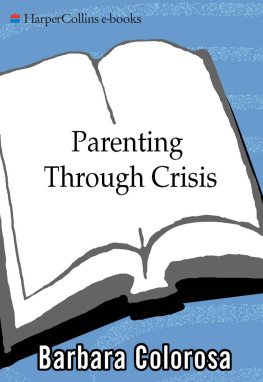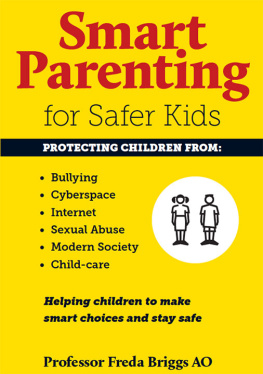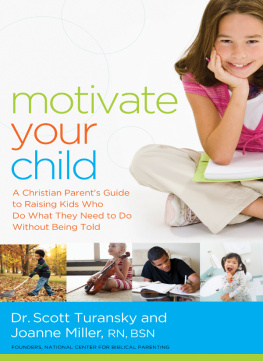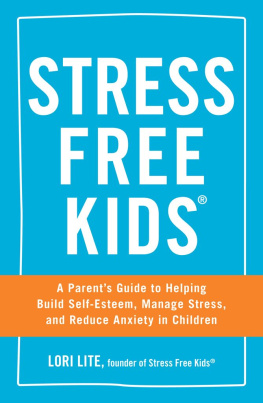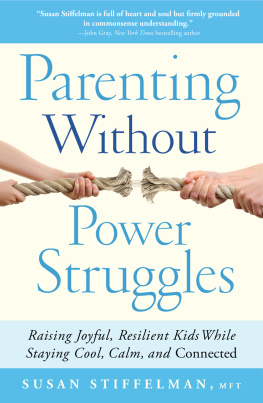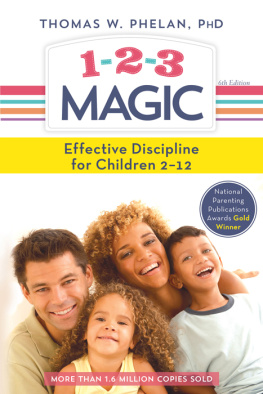To Anna, Maria, and Joseph,
I wish for each one of you
the gentle joy that comes with justice seeking and peacemaking
because they are children
and for no other reason
they have dignity and worth
simply because they are
B ARBARA C OLOROSO
M y road to parenting was anything but a direct route. In the late 1960s, at the age of seventeen, I entered a Franciscan convent to become a nun, and began my freshman year at university to become a special education teacher. Little did I know then that the path to these two goals would radically influence my parenting skills years later. The special education courses I took during my first year were based on a behaviorist model, full of rewards and punishments, charts, stickers, stars, threats, and bribes. The model worked with rats; surely it would work with kids. Something didnt seem right about manipulating rats and kids with rewards and punishments, threats and bribes, but I couldnt put into words the discomfort I was feeling, and besides, I didnt know what to use in their place.
The following year, entering the canonical novitiate, also known as a year of silence and reflection, I immersed myself in the study of philosophy and theology. It was during this time that I began to challenge what I had learned in my education courses. I carried on long arguments in my head, similar to the arguments I find myself in now with my three teenagers. And the arguments in my head then were as futile as the arguments with my teenagers now. Since there was no decisive winner or loser, when I began my teaching career I tried to reconcile the teaching methods with my philosophical tenets, but that didnt work either. Believing kids were worth it simply because they were, not because they produced or behaved in a way I wanted them to, didnt match with rewarding appropriate behavior and ignoring or punishing inappropriate behavior. Not treating them in a way I myself would not want to be treated conflicted with making them mind for their own good. And using techniques that left their dignity and my dignity intact didnt connect with withholding food from rats or kids. What did all of this have to do with the Latin roots of disciplining with authority, that is, giving life to a childs learning? Could children become responsible, resourceful, and resilient if they were controlled, manipulated, and made to mind? Could they develop a sense of inner discipline if all of the control came from outside?
kids are worth it! giving your child the gift of inner discipline is my answer to those questions. The answer is more an approach to parenting than a collection of techniques. Believing kids are worth it, not treating them in a way I would not want to be treated, and behaving in a way that leaves our dignity intact are not themselves specific tools; rather, they provide an attitude and an environment that helps me help my children develop a sense of self-discipline.
With a husband and three kids, I am obviously no longer a nun. I am also not a perfect parent. In the midst of the many trials and errors I have had in raising them, I have often told my three kids how lucky they were not to have a perfect parent. Anna has just as often replied, You are so lucky; you dont have perfect kids either. Maria has been known to ask, How come you dont always do what you tell other people to do? And Joseph once asked a group of teachers, who had just attended one of my lectures, if they would like him to be good or bad. They laughed, I groaned, and with an innocent look on his face, Joseph remarked, Well, they want to see what you would do either way. The following pages are what I do, have done, would have done, wished I had done, and plan to do next time.
These are only hints and guesses,
Hints followed by guesses; and the rest
Is prayer, observance, discipline, thought and action.
T. S. E LIOT , F OUR QUARTETS
Kids Are Worth It!
Believe nothing merely because you have been told itDo not believe what your teacher tells you merely out of respect for the teacher. But whatsoever, after due examination and analysis, you find to be kind, conducive to the good, the benefit, the welfare of all beingsthat doctrine believe and cling to and take it as your guide.
B UDDHIST A PHORISM
You have come here to find what you already have.
B UDDHIST A PHORISM
T here are no quick fixes, easy answers, or recipes for parenting, but I believe most of us have the tools we need to be good parents if only we could find them. Our problem is that these tools are often covered over at the bottom of our mental toolboxes. The tools that come first to hand do not serve us well. These tools were given to us, often unintentionally and without malice, by our parents, grandparents, siblings, and extended family, as well as by our society. Often, when a hammer would best serve our needs, we reach into the toolbox and come out with a hatchet without realizing it. It is no wonder that some of our parenting carpentry is such a mess.
To get the tools we need, we must first become aware of the inappropriate, ineffective, or destructive tools that we are using. Then we must be willing to let go of the old tools and begin using those that can serve us and our children better.
In this book we will look closely at a few of these inappropriate tools. Some you may never have used or even thought of; others youll swear were at your dinner table last night. Look them over and decide which ones you need to change.
Talk to your kids about them and ask your kids to help you. Its unnerving to be in a crowd at the city park and have my son tell me Im giving him a minilecture when I am right in the middle of a good one, or to have one of my daughters tell me, rightfully so, that the question I just asked was really dumb. But in both situations the kids were right, and I got the opportunity to stop and start over using more appropriate tools. Are you uncomfortable with the way you handled your teenager last night? Did you lose it when your toddler decorated the walls with permanent marker? Are you angry, hurt, or embarrassed? Questioning and exploring are the first steps toward change. Its a two-way street; when you talk to your children about helping you stop using inappropriate tools or doing things that get in the way of their growth, you can also show them that the temper tantrum they are throwing in the grocery store just isnt going to get them the cereal they want.
As you begin to identify the ineffective tools that are a part of your parenting toolbox, you will also realize that you have the opportunity to unpack them and replace them with lighter, more responsible, constructive tools that do not weigh you down.
Before identifying and sorting the tools, it helps to know what kind of mental toolbox we are using to carry them around. The toolbox is defined by the answers to two basic questions:
- What is my parenting philosophy?
- What is my goal in parentingto influence and empower my children or to control them and make them mind?
W HAT IS MY P ARENTING P HILOSOPHY ?
Ones philosophy is not best expressed in words, it is expressed in the choices we make. In the long run, we shape our lives and we shape ourselves. The process never ends until we die. And the choices we make are ultimately our responsibility.
E LEANOR R OOSEVELT
Few of us explore our philosophy of parenting before we become parents. Then, after we have our children, when we are tired and worn out, we tend to parent the way we were parented. Our mothers words roll off our tongue even though we swore wed never talk like her. Our hand swings to hit our child just as our fathers hand swung to hit us, and yet we swore wed never hit our children. In a panic we frantically read parenting books and attend every lecture on parenting offered in our community.


